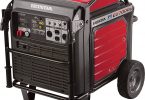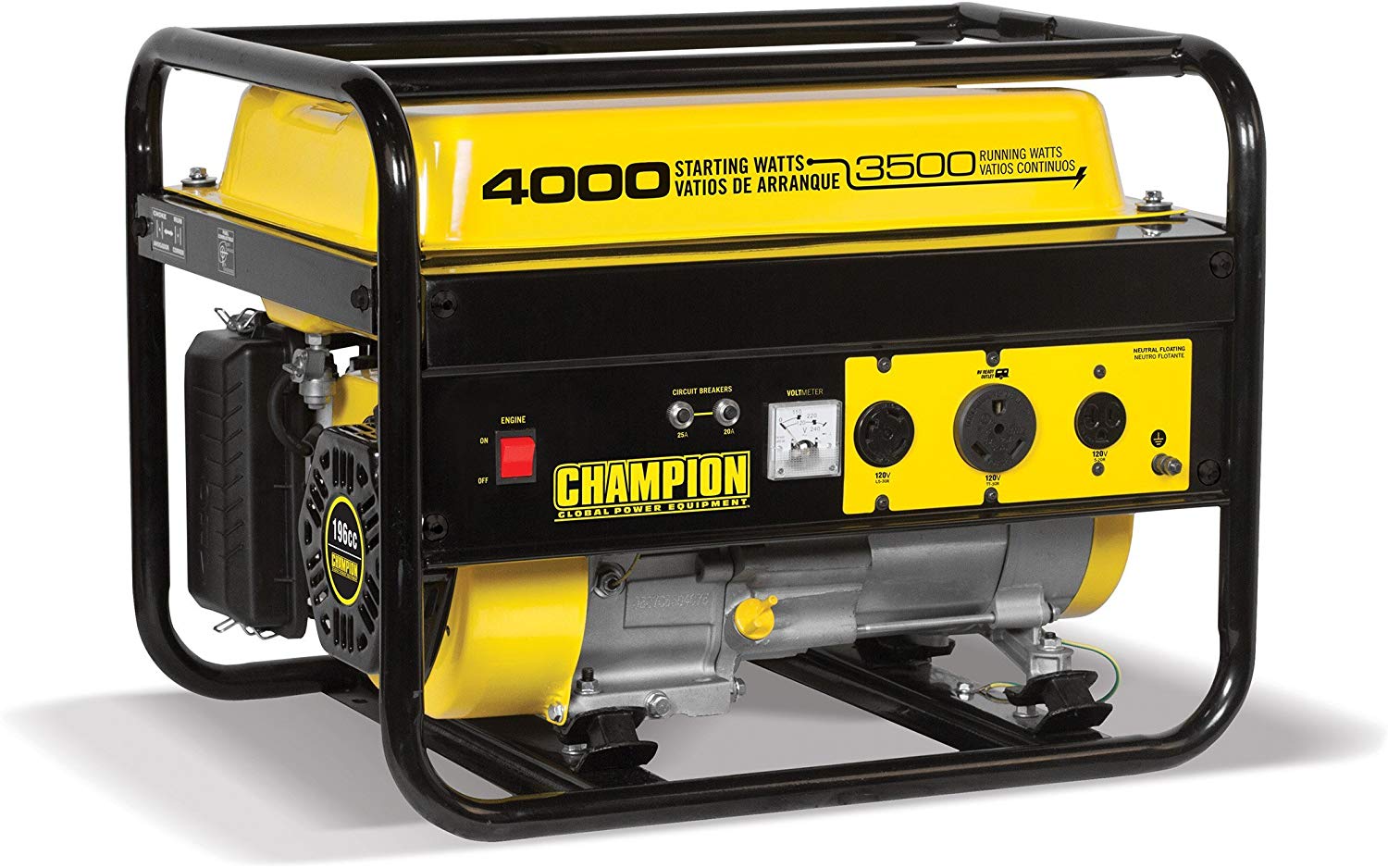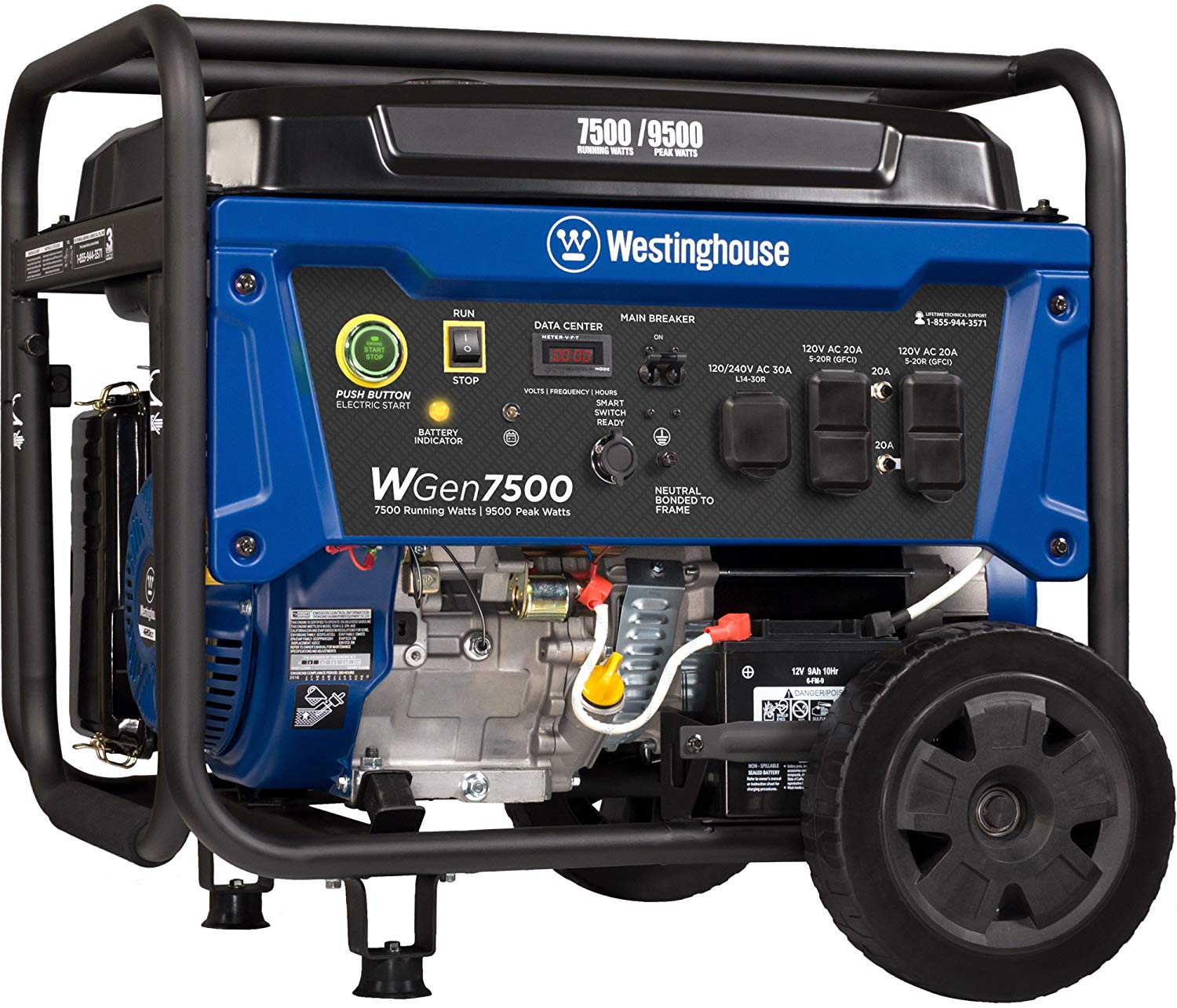Searching for a generator, but not sure where to start? Well, you’re in the right place. We’ve conducted extensive research across many brands of generators, and we’re going to help you choose the best generator for YOUR needs.
Table of Contents
There are three steps for choosing the perfect generator:
- Decide how much power you need
- Figure out if you need a portable generator or a standby generator
- Make your selection from the recommended models
How Much Power Do You Need?
Generators are sold by wattage. The higher the wattage, the more appliances it can support. Here are a few common appliances and their wattage:
- Washer – 350 – 500 Watts
- Dryer – 1800 – 5000 Watts
- Dishwasher – 1200-2400 Watts
- Window Fans – 55-250 Watts
- Refrigerator – 725 Watts
- Television – 120 Watts
- Microwave – 750 – 1500 watts
- Laptop – 200 Watts
- Medium Window AC Unit –1000 Watts
Power needs depend on whether you need to support an entire house or just a few appliances. Keep in mind that some appliances need extra power to get started and then taper off, while others require the same amount of energy to start and run. Here’s a breakdown of Wattage power:
2000 Watts – This amount of power can support a few appliances during a power outage, for instance, the lights, television, and refrigerator. Lower wattage generators are typically portable, so they’re useful for camping and tailgating.
3000-4000 Watts – At 3000-4000 watts, you can still have the convenience of portability while supporting additional appliances such as a small/medium sized AC.
5000-7500 watts – This level of wattage will support a small home during an outage. You could run AC, along with the refrigerator and a few other appliances. At 7,500 watts, you could easily add an electric water heater.
10000 – 22000 – These generators have enough power to supply power to large homes, for an extended amount of time. You can comfortably support an electric furnace, central AC, refrigerator, as well as other essential appliances.
Portable vs. Standby
The next step is to select which style of generator fits your needs: Portable or standby.
Portable Generator
Portable generators are smaller and mobile. They feature built-in fuel tanks so they can run anywhere. There are also larger portable generators that can power more than essentials. They come in two types of categories, conventional and inverter. Conventional portable generators operate at a fast speed which leads to more noise and fuel. Inverter generators only produce the power that’s needed to support the load. Inverters are quiet and fuel efficient.
Pros of Portable Generators
Portable generators cost less than standby generators. They’re more convenient for those that live an active lifestyle and need an on the go power source. They’re straightforward to use – you could purchase one and have it up and running the same day. Store it away when you don’t need it, and take it out when necessary.
Cons of Portable Generators
A big downside to portable generators is that you’ll need to refill the generator manually, so it’s necessary to store several large gas containers for a prolonged outage.
Standby Generator
A standby generator is permanently installed outside of your home on a concrete pad, and connected directly to your home’s electrical system. They’re equipped with an automatic power transfer switch.
Pros of Standby Generators
One of the main benefits of using standby generators is the ability to switch between systems seamlessly. When a service disruption is detected, power switches from the regular power grid, to your generator. The generator is also shut down automatically when the primary power source is restored. They are often fueled from propane or city gas lines, so you won’t need to refill them. The transfer switch also provides surge protection for your appliances. The higher wattage means that they can support many more devices. Standby generators are quiet compared to the conventional portable generators.
Cons of Standby Generators
Standby generators are pretty large, so they’ll take up a lot of space in your yard; which can pose a challenge if you live in a condo or an apartment. The installation requires advanced electrical skills and needs to be handled by a professional. Standby generators are expensive; they’ll typically cost you between $3000.00-$6000.00.
Recommended Generators for all Types of Needs
Best Portable Generators
Portable Generators for Outdoor Activities
For camping we would recommend inverter portable generators. They are quieter and lighter than conventional portable generators.
Top Choice
Honda EU2200i – Honda has a solid reputation for reliable generators. This generator weighs about 46 pounds, so it’s easy to carry. It also has a reputation for being very quiet, so it won’t drown out the fun when you’re camping or tailgating. The cost is around 1000.00.
Budget Choice
WEN 56200i – The wattage is slightly lower than the EU2200i. Other than that it’s nearly identical in terms of fuel tank size and run time, and it has a variety of power ports. It costs about half as much as the EU2200i.
Portable Generators for Home Use
Top Choice – Conventional Portable
Westinghouse WGen7500 – This generator can start and run lots of appliances during a power outage. The cost is around 950.00. It may not be ideal for apartment or condo use because of the noise and emissions. This unit comes with a remote start key.
Budget Choice – Conventional Portable
Champion 3500-Watt – At around 300.00, this generator can adequately power essential items such as a refrigerator, lights, and sump pump. Features volt guard to prevent overloads and protect against surges.
High Power – Inverter Portable
Honda EU7000is – This generator will run all of your essential appliances with a low level of noise and clean power. The price tag is expensive at 4500.00. It provides 6-18 hours of energy on one tank of fuel.
Low Power – Inverter Portable
Honda EU2200i – It’s not only suitable for outdoor use. It can also provide reliable power to your home during an outage. They’re super quiet and excellent fuel efficiency.
Best Standby Generators
Top Choice
Generac Guardian 13kW Standby Generator – Powers the whole house, but still super quiet for a standby. It features an LCD display that shows battery status and maintenance intervals. Wi-Fi mobile link monitoring allows you to remotely access information about your generator such as operating status, historical information, and the maintenance schedule. The price is around 3700.00.
Budget Choice
Champion 12.5-kW – The cost is about 500.00 less than the Generac Guardian 13kW Standby Generator. Operates in extreme heat or subzero temperatures. It provides 12,500 watts of continuous power with propane, and 11,000 watts with natural gas.
High Power
Generac Guardian 22kW Standby Generator – The most expensive option at 5000.00, this powerful generator supports 16 circuits within your home. It has a power capability of 22 KW and WiFi mobile link monitoring.


